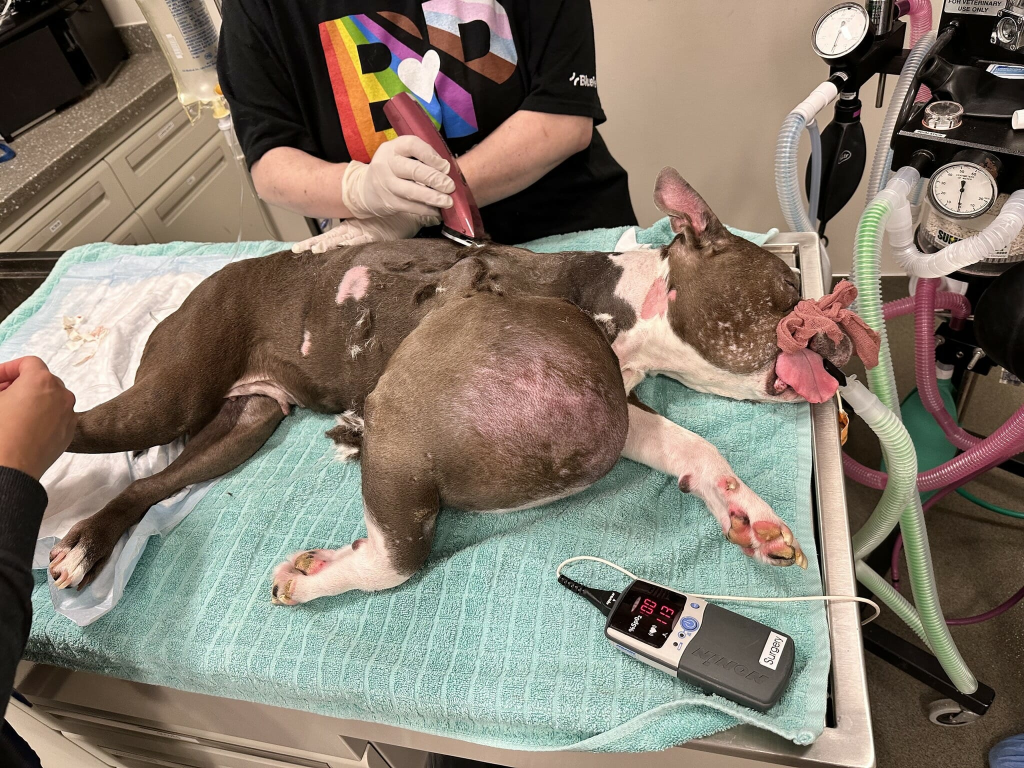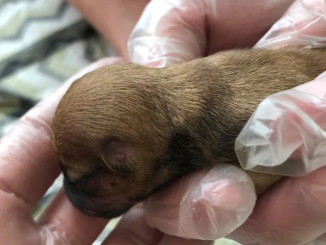Animal shelters do incredible work giving pets a second chance. Some animals arrive at shelters in shocking condition, but they still step up to give them the love and care they need.
That was the case for a dog named Libby, who had a tumor the size of a volleyball. But now, her story has a happy ending.
In August, the Humane Society for Tacoma and Pierce County, in Washington state, took in a stray pit bull named Libby. They said the dog was “full of life” and had a “sweet face and kind eyes.”
However, Libby also had a serious medical concern: a 10-pound tumor the size of a volleyball, one of the largest masses they had ever seen:

Libby arrived at a hectic time for the shelter: HSTPC says Libby was just one of three urgent cases they responded to in 48 hours, and as Washington’s largest-intake shelter dozens of new animals were arriving every day.
Despite that, they resolved to give Libby the best possible care, even though they weren’t sure what the future had in store for the poor dog.
“She deserves the most compassionate care possible, but we don’t know what her outcome will be at this time,” the shelter wrote in August. “Our veterinary team is working on every possible option and will start with testing to understand what kind of tumor Libby has. For now, she is receiving pain medication to ease her discomfort and endless love from our staff.”
After giving Libby an x-ray, they discovered the tumor was in the bone of her upper right leg, and would require amputation. Reactive inflammation caused the tumor to swell to its unusual size, and was causing her agonizing pain.

Through generous donations from supporters, the shelter was able to pay for Libby’s leg amputation. The surgery, done by the vet staff at BluePearl Pet Hospital, was a success and Libby was finally free of the pain she had been living through.
Sadly, even though her tumor was gone, she was diagnosed with aggressive bone cancer, and her time on earth might be limited. But in happy news, Libby has found a home!
According to HSTPC, a vet tech fell in love with Libby and agreed to adopt her. Even though she knows that Libby might not live long, she wanted to fill her remaining days with love.
“There’s something in her eyes that begs for love and safety,” her new adopter said, according to a Facebook post. “I couldn’t turn away from that.”

Libby has now been renamed “Wiggles” and is enjoying her new home, playing with her dog brother and family and taking lots of cozy naps on the couch.
“Though we’re uncertain how much time she has left, we know she’ll spend her remaining days
Little Pup was abandoned, forced to endure a string of sorrowful days. Today, he has transformed into an exceptionally friendly companion

In a world the place compassion and kindness are important, the story of just a little pet’s transformation from a distressed and confined existence to changing into an extremely resilient and succesful member of society is a testomony to the facility of affection and care. This heartwarming story highlights the resilience and capability for change that resides inside each dwelling being.
The journey begins with a small pet, as soon as stuffed with innocence and curiosity, who discovered itself trapped by the tough chains of confinement. Days become weeks, and fear settled within the hearts of those that encountered this unlucky creature. The pet’s eyes, as soon as full of hope and vitality, held a glimmer of disappointment, as if it had misplaced all religion on the planet.
Nonetheless, as destiny would have it, a collection of lucky occasions unfolded, bringing a ray of sunshine into the pet’s life. A form-hearted particular person, pushed by empathy and a need to make a distinction, found the pet’s plight. Decided to offer an escape and an opportunity at a greater life, they set out on a mission to liberate the toddler from its confinement and provide it an opportunity at a greater life.
With cautious dedication, the chains that had shackled the pet to its previous have been regularly eliminated. Step-by-step, the pet started to emerge from its cocoon of isolation and provide its loyalty and friendship to the world. The pet’s eyes, now full of hope and vitality as soon as once more, shone as if it had rediscovered the enjoyment of life. The toll of its restrictive life-style had been evident, because it struggled to search out consolation on the planet it had been denied for thus lengthy.
Nonetheless, as destiny would have it, a collection of lucky occasions unfolded, bringing a ray of sunshine into the pet’s life. A form-hearted particular person, pushed by empathy and a need to make a distinction, found the pet’s plight. Decided to offer an escape and an opportunity at a greater life, they set out on a mission to liberate the toddler from its confinement and provide it an opportunity at a greater life.
With care and dedication, the chains that had sure the pet to its previous have been regularly eliminated. Step-by-step, the pet started to emerge from its cocoon of isolation and prolong its belief to others. The pet’s eyes, now full of hope and vitality as soon as once more, gleamed as if it had rediscovered the enjoyment of life. The journey of its outstanding transformation had simply begun.
Within the days that adopted, the pet was immersed in an atmosphere full of love, persistence, and understanding. It was showered with light touches, soothing phrases, and nourishing meals. The pet’s once-downtrodden spirit started to blossom, forging deep emotional connections with the individuals round it.
The transformation of this little pet serves as a reminder that each dwelling being has the potential to beat adversity and thrive. It’s a testomony to the facility of compassion and the profound affect it will probably have on a person’s life. Let this story encourage us to be sort, empathetic, and responsive caretakers of all creatures, making certain that they too have the chance to flourish on this world.



Leave a Reply